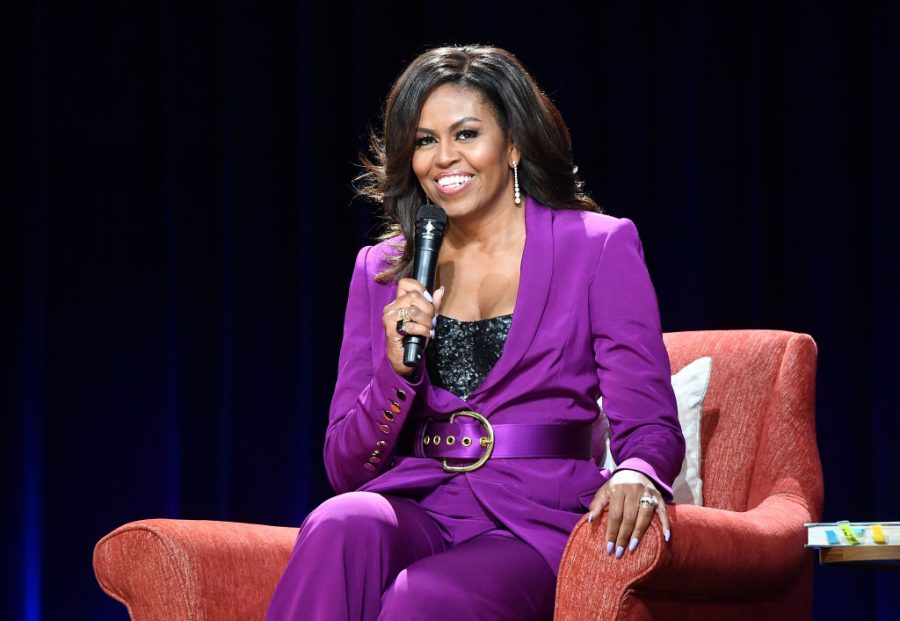Celebrities and Their Encounters With Racism
Photo by: Getty Images
ATLANTA, GEORGIA – MAY 11: Former First Lady Michelle Obama attends ‘Becoming: An Intimate Conversation with Michelle Obama’ at State Farm Arena on May 11, 2019 in Atlanta, Georgia. (Photo by Paras Griffin/Getty Images)
With Black Lives Matter protests taking place across the world in response to the murder of Black Americans, many celebrities have been vocal in their support for unification.
Michelle Obama became the first black First Lady of the United States, who has since empowered countless women to fight for their rights, and advocate for poverty awareness, education, nutrition, physical activity, and healthy eating. However, Obama revealed that she endured racist remarks throughout her time in the White House. Speaking at the Women’s Foundation of Colorado’s 30th anniversary celebration in Denver back in 2017, the former First Lady recalls being called an “ape in heels” and was told she had a “gorilla face” by government officials.
“The shards that cut me the deepest were the ones that intended to cut. Knowing that after eight years of working really hard for this country, there are still people who won’t see me for what I am because of my skin color,” said Obama, according to The Denver Post. “Women, we endure those cuts in so many ways that we don’t even notice we’re cut. We are living with small tiny cuts, and we are bleeding every single day, and we’re still getting up.”
An older video of actress Meghan Markle discussing her experience with racism has recently resurfaced on the internet. The Suits star took part in a campaign video in 2012, in which she spoke about her love of Los Angeles and her hopes for her future children. In the video clip, Meghan is wearing a white t-shirt displayed with the words: ‘I won’t stand for racism.’ “My name’s Meghan Markle, and I’m here because I think it’s a really important campaign to be a part of. For me, I think [this campaign] really hits a personal note. I’m bi-racial, most people can’t tell what I’m mixed with, and so much of my life has felt like being a fly on the wall. And so some of the slurs I’ve heard or the really offensive jokes, or the names, it’s just hit me in a really strong way. And, you know, a couple of years ago I heard someone call my mum the N word. So I think for me, beyond being personally affected by racism, just to see the landscape of what our country is like right now, certainly the world, and to want things to be better,” said Markle.
Last year, actor Idris Elba expressed his disappointment over the racist backlash he endured after rumors emerged of the possibility that he would replace Daniel Craig as James Bond. Speaking to Vanity Fair, he said, “You just get disheartened, when you get people from a generational point of view going, ‘It can’t be,’ and it really turns out to be the color of my skin. And then if I get it and it didn’t work, or it did work, would it be because of the color of my skin? That’s a difficult position to put myself into when I don’t need to.”
Oscar nominee Dave Patel is one of the few actors of Indian origin to make it big in Hollywood. The actor, who has starred in Lion and Slumdog Millionaire, previously opened up about his background while speaking with The San Francisco Times last year, saying, “I get flak sometimes because people will say, ‘Why aren’t they giving these roles to a real Indian?’ I wonder, what does that even mean? The only way I can converse with my grandparents is in Gujarati. Does that make me real enough?” He then added: “Or am I only allowed to witness the moments of prejudice and racism going through airports? Is that the only bit that I’m allowed of the culture?”
Not only has the industry provided stars with unethical and racist encounters, indisputable discrimination in Hollywood also contributes to a serious race problem in the modern film industry.
A Washington Post analysis of the 2015 Academy of Motion Picture Arts and Sciences memberships found that film directors, who rank among Hollywood’s most powerful decision makers, were primarily white males.
While Hollywood continues to do a better job of diversifying itself and creating more roles made for people of color, things are changing. Celebrities are pushing back against prejudice stereotypes of what “red-carpet hair” or “TV hair” should look like. “There was a moment after Grey’s [Anatomy] and Scandal and [How to Get Away With] Murder were all on the air, when we started casting and I started seeing actresses of color come in with natural hair,” said television producer Shonda Rhimes at a Dove event for the Crown Act in 2019. “Five years ago, that never would have happened. Everybody had straight hair and looked a certain way. At a certain point in time, it just shifted. It was kind of wonderful.”
Still, it hasn’t been without a fight because time and time again, Black celebrities make headlines as they speak out about their horror stories from behind the scenes—like being told their desired styles are “too Black” (Gabrielle Union on America’s Got Talent), or being forced to treat their hair to make it more “manageable” (Revenge’s Ashley Madekwe).


